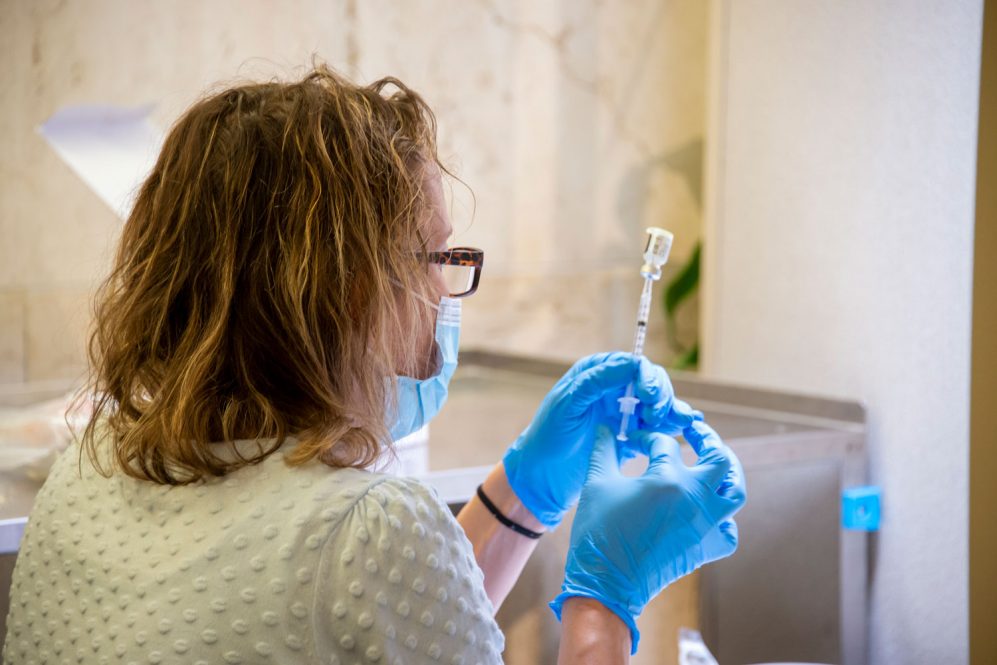It’s another group of health care professionals who may not physically appear on the front lines of patient care, but they are right there in the trenches with those who do.
UConn Health’s pharmacy staff includes more than 85 employees in nearly 20 roles, many in areas that never close.
“Our pharmacy staff is another example of unsung heroes who, while not always recognized, continued to show up and excel in their jobs to help deliver our outstanding patient care at the height of a pandemic and beyond,” says Dr. Bruce T. Liang, UConn Health’s interim CEO.
This year’s National Pharmacy Week, established in 1925 as National Pharmaceutical Week by what was then called the American Pharmaceutical Association, is Oct. 16-22.

“Working during the pandemic was a challenge,” says Paul Armstrong, weekend overnight central pharmacist. “I felt exposed, not to the disease but rather to the fear that my night staff would not be able to deliver the standard of care that was needed in such an ever-changing environment. However, we were able to do so with the foresight of management, work-from-home pharmacists, and dedicated technicians.”
Armstrong, who describes himself as “a utility hitter on a unique team of pharmacists, all of which have patient care and safety at the forefront of their practice,” says his favorite part of his job are the energy and contributions of the students and pharmacy residents. He joined UConn Health in 2006.
Asma Shahid-Khan joined the UConn Health pharmacy as a technician in 2016.
“Working through the pandemic has tested our systems and our personal strengths in various ways, but I like to believe we have come out stronger with faster, user-friendly solutions, and more knowledgeable of our capabilities as a department and UConn Health as a whole,” says Shahid-Khan, who last year moved to the information technology side of pharmacy, as an administrative and clinical systems coordinator.
Molly Kennedy, who joined UConn Health as a pharmacy technician in 2009, took a similar path, moving to pharmacy informatics earlier this year.
“I enjoy this role because it keeps me on my toes and learning new things every day,” Kennedy says. “In my short time within the department, I have been able to support the pharmacy with maintenance and improvements related to pharmacy systems. Some duties include clinical system maintenance, troubleshooting, deploying pharmacy-specific technology, and analyzing abilities for technology improvements.”
Aneta Grauer has the perspective of a pharmacy operations manager, a role she held until becoming an informatics pharmacist last month.
“Although working through the pandemic was challenging, in many ways it was also inspiring to see various departments and disciplines come together to care for our patients,” Grauer says. “In my role, I supported patient care by facilitating setup of overflow units, and ensuring they were properly equipped and stocked. It pushed everyone to think outside of the box and work as a team.”

Now her focus is on troubleshooting software vital to the pharmacy’s operation and optimizing the technology to improve workflows.
While they may not always be in lab coats traditionally associated with pharmacy work, those working in pharmacy informatics have crucial responsibilities that are largely unseen and unheralded. Daniel Vo’s time as an informatics pharmacist goes back to just before the pandemic.
“My main responsibilities are to ensure pharmacotherapeutic therapies are configured safely and interoperable in our electronic health record and pharmacy systems, and to improve and optimize processes through implementation and support of technology systems,” Vo says. “Working through the pandemic required all of us to be adaptable to a constantly evolving landscape. The more we learned about COVID-19 and as it surged through our communities, it was imperative we were able to shift priorities. From biocontainment changes to the rollout of the vaccine and monoclonal antibody therapies, our team was one of the many cogs here at UConn Health striving to care for the members of our community.”
Procurement and inventory pharmacist Iwona Zalewska says the pandemic caused supply and shipment disruptions that still have an impact.
“The pharmaceutical industry faces drug supply chain issues, increases in pharmaceutical spending, and high medication costs,” Zalewska says. “Our everyday efforts concentrate on making sure we supply medications needed to take care of our patients, evaluate our inventory, provide purchase reports to assess our formulary and help decision making during pharmacy and therapeutics meetings.”
Kevin Chamberlin, interim assistant vice president and chief of pharmacy, says a great deal happens behind the scenes to secure medications in a safe manner and get them to patients.
“Some medications have to be made from scratch, or compounded, others reconstituted or mixed under sterile conditions,” Chamberlin says. “We send test packages out in the US mail and various shipping procedures to test the integrity of our pharmaceutics that are shipped up and down the east coast from our specialty pharmacy. We monitor temperature sensors and their alerts 24/7 on fridges wherever a medication is stored so we can ensure the integrity of our products while they await administration to our patients. We ensure a safe, sealed process by which controlled substances enter our facilities all the way through when they reach the patient to avoid drug diversion at any step. We review every medication-related safety event and reported adverse event.”
And you can count Vo, one of the informatics pharmacists, among those who say they’re in the right place to do this work.
“I am privileged to be a part of the team working in the UConn Health Pharmacy,” Vo says. “We are supportive of one another and have and continue to work collaboratively together at a higher level.”



